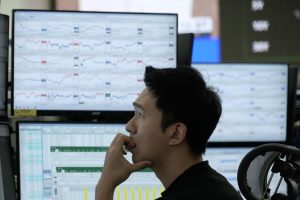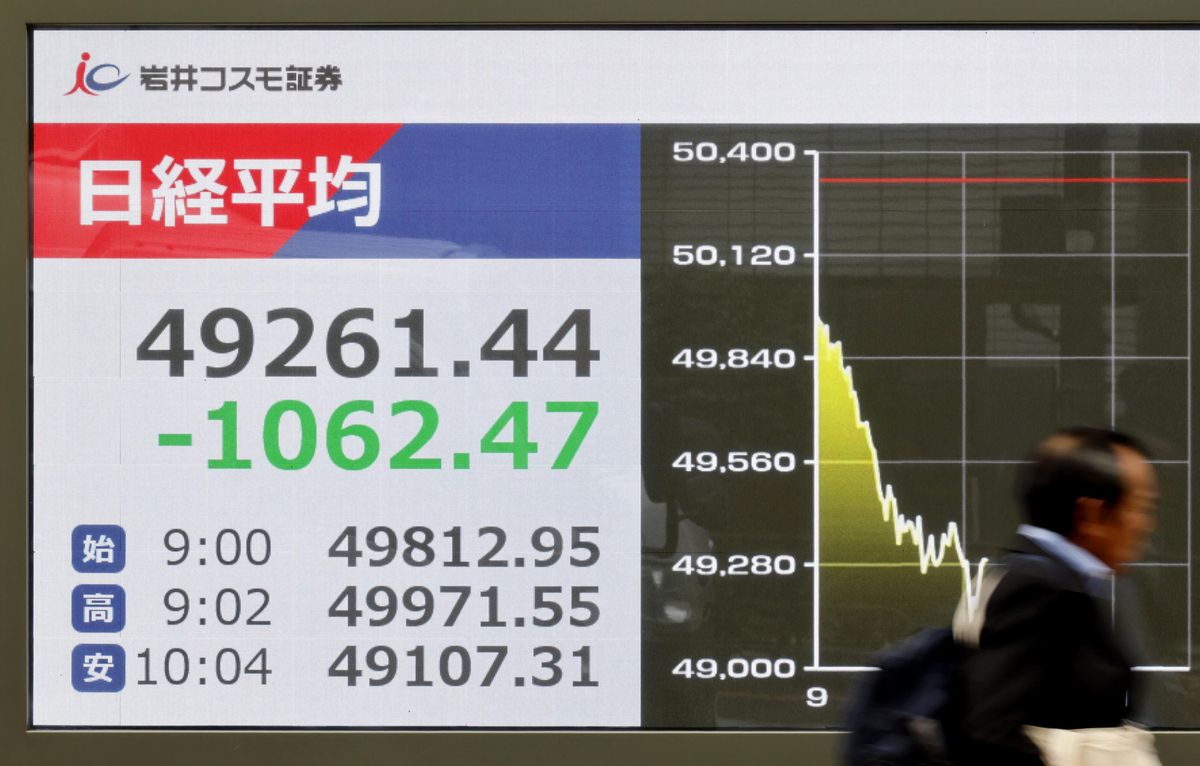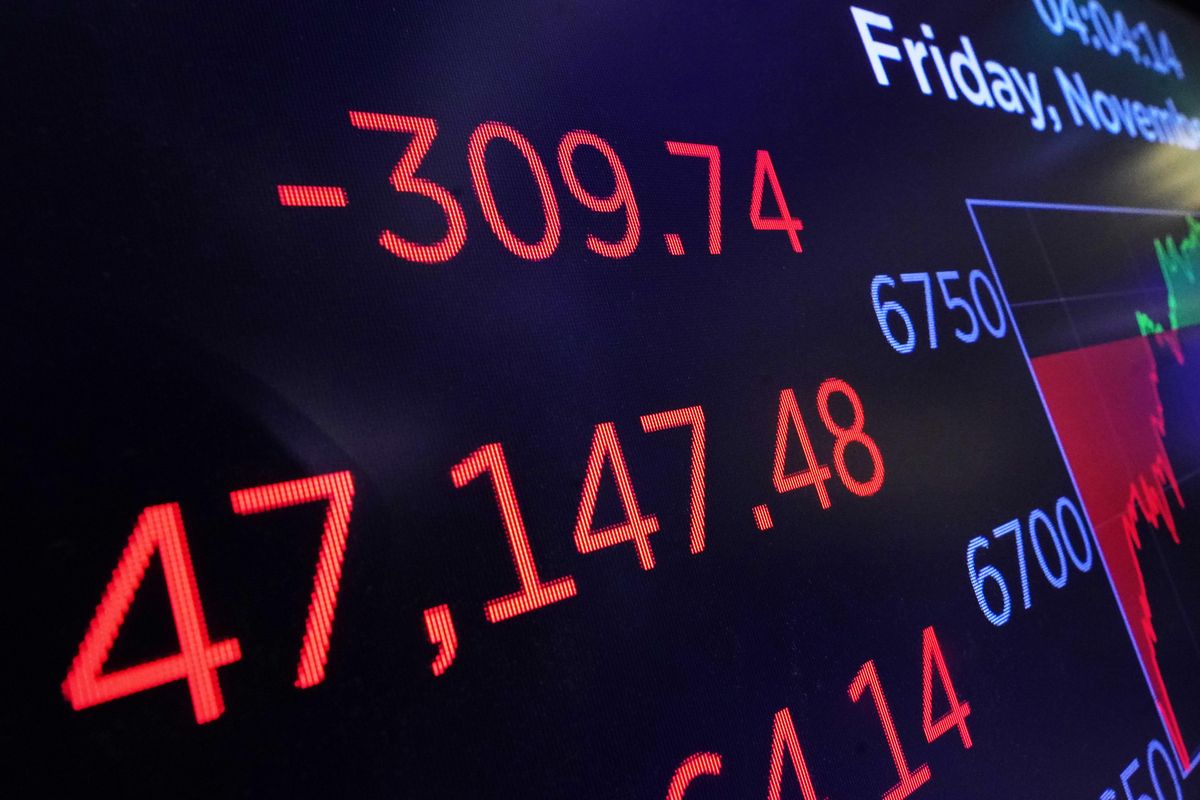BANGKOK (AP) — Asian shares tumbled on Tuesday, with benchmarks in Tokyo and Seoul sinking more than 3%, after Nvidia and other artificial-intelligence -related shares pulled U.S. stocks lower.
U.S. futures dropped, with the contract for the S&P 500 down 0.6% while the future for the Dow Jones Industrial Average was down 0.4%.
Computer chip giant Nvidia, at the center of the craze over AI, is due to report its earnings on Wednesday. Worries that stock prices of such companies have shot too high have roiled world markets recently, with big swings in places that rely heavily on trade in computer chips such as South Korea and Taiwan.
Also hanging over the markets is the release due Thursday of U.S. employment data that was delayed by the prolonged government shutdown.
Regional markets felt a chill after the yield on 30-year Japanese government bonds surged to 3.31%, reflecting rising risks as Prime Minister Sanae Takaichi prepares to boost government spending and push back the timetable for bringing down Japan’s huge national debt.
The yen was trading above 155 to the U.S. dollar, near its highest level since February. On Monday, the yen fell to its lowest level against the euro since 1999, when the unified European currency was launched.
Tokyo’s Nikkei 225 was down 3% at 48,835.20 by midday, with selling of tech shares leading the decline. Chip maker Tokyo Electron shed 5.4%, while equipment maker Advantest dropped 4.6%.
In Seoul, the Kospi fell 3.1% to 3,960.82. Samsung Electronics dropped 2.9%, while chip maker SK Hynix shed 5.7%.
In Taiwan, the Taiex fell 2.3% as TSMC, the world’s largest contract chip manufacturer, declined 2.4%.
Chinese markets were not immune from heavy selling.
Hong Kong’s Hang Seng declined 1.5% to 25,997.20, while the Shanghai Composite index slipped 0.6% to 3,949.83.
In Australia, the S&P/ASX 200 gave up 2.1% to 8,452.50.
On Monday, the S&P 500 fell 0.9% to 6,672.41, pulling further from its all-time high set late last month. The Dow industrials dropped 1.2% to 46,590.24, while the Nasdaq composite sank 0.8% to 22,708.07.
Nvidia dropped 1.8%, though it is still up nearly 40% this year. Losses for other AI winners included a 6.4% slide for Super Micro Computer.
Other areas of the market that had been high-momentum winners also sank. Bitcoin extended its decline, dragging down Coinbase Global by 7.1% and Robinhood Markets by 5.3%. Early Tuesday, it was down 2% at $90,110.
Critics have been warning that the U.S. stock market could be primed for a drop because of how high prices have shot since April, leaving them looking too expensive.
However, Alphabet gained 3.1% after Berkshire Hathaway said it has built a $4.34 billion ownership stake in Google’s parent company. Berkshire Hathaway, run by famed investor Warren Buffett, is notorious for trying to buy stocks only when they look like good values while avoiding anything that looks too expensive.
Another source of potential disappointment for Wall Street is what the Federal Reserve does with interest rates. The expectation had been that the Fed would keep cutting interest rates in hopes of shoring up the slowing job market.
But the downside of lower interest rates is that they can make inflation worse, and inflation has stubbornly remained above the Fed’s 2% target.
Fed officials have also pointed to the U.S. government’s shutdown, which delayed the release of updates on the job market and other signals about the economy. With less information and less certainty about how things are going, some Fed officials have suggested it may be better to wait in December to get more clarity.
A strong jobs report on Thursday would likely stay the Fed’s hand on rate cuts, while figures that are very weak would raise worries about the economy.
In other dealings early Tuesday, U.S. benchmark crude oil lost 42 cents to $59.49 per barrel. Brent crude, the international standard, gave up 43 cents to $63.77 per barrel.
The dollar fell to 155.08 Japanese yen from 155.26 yen. The euro rose to $1.1600 from $1.1593.
___
AP Business Writers Stan Choe and Matt Ott contributed.
By ELAINE KURTENBACH
AP Business Writer



